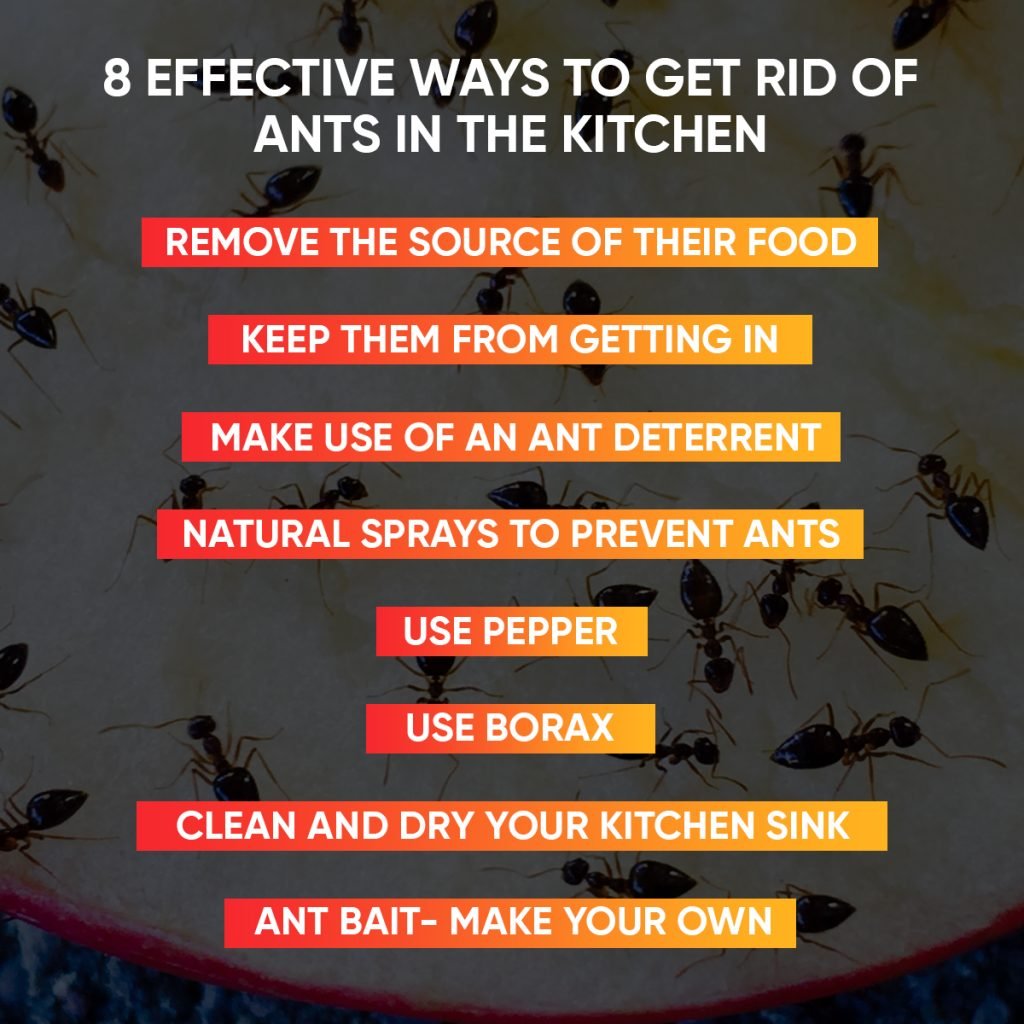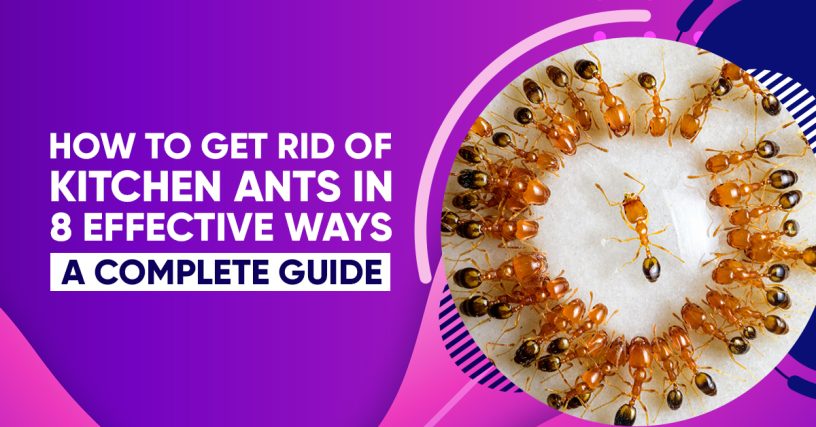This blog is all about how to get rid of kitchen ants and their nests in your kitchen. If you need a solution for how to get rid of ants in the kitchen, read the whole context below.
Imagine this:
One a beautiful morning, you open your pantry door to get some pasta or beans, and suddenly you see them. A perfectly straight line of ants marching across the shelf of a cabinet or up the pantry wall.
Sigh!
While there are more dangerous pests than ants, these small insects have a horrible habit of getting into everything, including your cabinets and food containers.
During the warmer months, they tend to go indoors, and the two most frequent varieties are odorous house ants and carpenter ants.
They quickly form a colony and parade around your kitchen carefree. These little animals don’t have to drive you mad, and there are some very effective methods to show them who’s in charge.
Table of contents
Estimated reading time: 6 minutes
What Could Be Causing Ants to Invade My Kitchen?
What causes ants in kitchen? Well, ants tend to appear suddenly in your home, apparently out of nowhere. Don’t become very frightened if you see them in the kitchen!
They care about getting easy access to the food and beverages in your kitchen, so they infest it. These annoying creatures will find a way to get to it if your kitchen surfaces are unclean or if there are crumbs, candies, or fruits that are easy to get to.
To attract ants, you only need sugar sprinkles, bits of cake, and even a little liquid spilled on the floor. As a result, they’re constantly looking for new places to make their home.
8 Effective Ways to Get Rid of Ants in the Kitchen

1. Remove the Source of Their Food:
Food residues and spills should be cleaned up before anything else. This is the first step in getting rid of kitchen ants. Ants usually set up camp in your house to search for food. So keep food in airtight plastic bags or containers.
They like honey, cornmeal, and sugar. Make sure your kitchen is free of streaks, splatters, and spills—clean food crumbs from appliances and trashcans. The tidy your kitchen is, the less probable ants will invade.
2. Keep Them from Getting in:
Ants may be kept out of your kitchen by preventing their entry points from being accessible. Seal cracks, fractures, and holes in your walls, radiator, and flooring.
Finding their place of entrance requires tracking their steps. Be sure to look in and around any windows, screens, or doors.
An ant trail should be visible outside your foundation if you live in a single-family detached house rather than an apartment in a high-rise structure.
3. Make Use of an Ant Deterrent:
Even if you seal up all probable access sites, you can still see ants in the kitchen. An ant deterrent such as pepper or cinnamon or curry powder or salt or chalk is a good idea in this situation.
It will help if you use caution while using these things around your child or pet’s eyes, nose, mouth, or skin.
Keep your cupboards and drawers fresh and clean by placing a few cotton balls soaked in citrus or peppermint essential oils in the corners.
Shop Amazon

4. Natural Sprays to Prevent Ants:
Lemon, peppermint, and essential vinegar oils may all be utilized to make the sprays easily at home.
Take half-full warm water, vinegar, or lemon juice. Shake the bottle well to ensure the solution is equally distributed.
Spritz your kitchen with a kitchen cleanser. Following their course, spray the solution where they’ve settled.
Read More: 10 Natural Ways to Get Rid of Ants in Your Home At Little Cost
5. Use Pepper:
Almost everyone has some black pepper in their pantry. It’s both a bug deterrent and a food enhancer in one.
Pepper is a deterrent to ants because of its intense aroma. You may use this product anywhere, as it’s safe for dogs and children.
6. Use Borax:
Making a borax combination that kills the entire ant colony and prevents it from returning is a very effective approach to getting rid of kitchen ants.
It takes a while for the ants to die from the borax mixture, so they return to their colony to distribute it amongst their members.
24 to 48 hours after taking the poison, it begins to take action. In this case, the entire colony is wiped out since every ant, including those in their egg phase, ingests borax.
7. Clean and Dry Your Kitchen Sink:
Clean and rinse leftover dishes in your kitchen. During the night, ants are attracted to food leftovers, so make sure there is none.
Consider using bleach to eliminate the lingering odor of food waste in the sink.
Shop Amazon

8. Ant Bait- Make Your Own:
Mix 1 tablespoon of organic boric acid with one tablespoon of maple syrup. Spread this mixture of boric acid and sugar over a slice of bread or cracker. Placing the baited food inside a hole-punched cardboard box is also a good idea.
The aroma of food will attract the ants to the bait, and the boric acid will kill the remainder of the colony when the ants bring the “meal” back to the nest, much like the commercially available ant bait.
When ants are most active in search of food during the night, leave the trap out. If you discover the ant nest, destroy the colony and expel the ants. Insecticides containing bifenthrin should be sprayed on the nest and the surrounding area.
Bottom Line
So this is all about how to get rid of ants in the kitchen. Using natural methods to get rid of ants in the kitchen can save you the time and effort it takes to search for efficient solutions.
Despite the fact that most ants are harmless, they may wreak havoc in your kitchen and undermine the foundations of your house. To end the infestation, use one of the natural solutions listed above.
You’ll be able to seal all of your walls, windows, and doors with caulk. After you’ve done all of that, be sure to declutter your home to reduce the number of hiding spots for ants.
More Ant Killer Choices

Read More:




